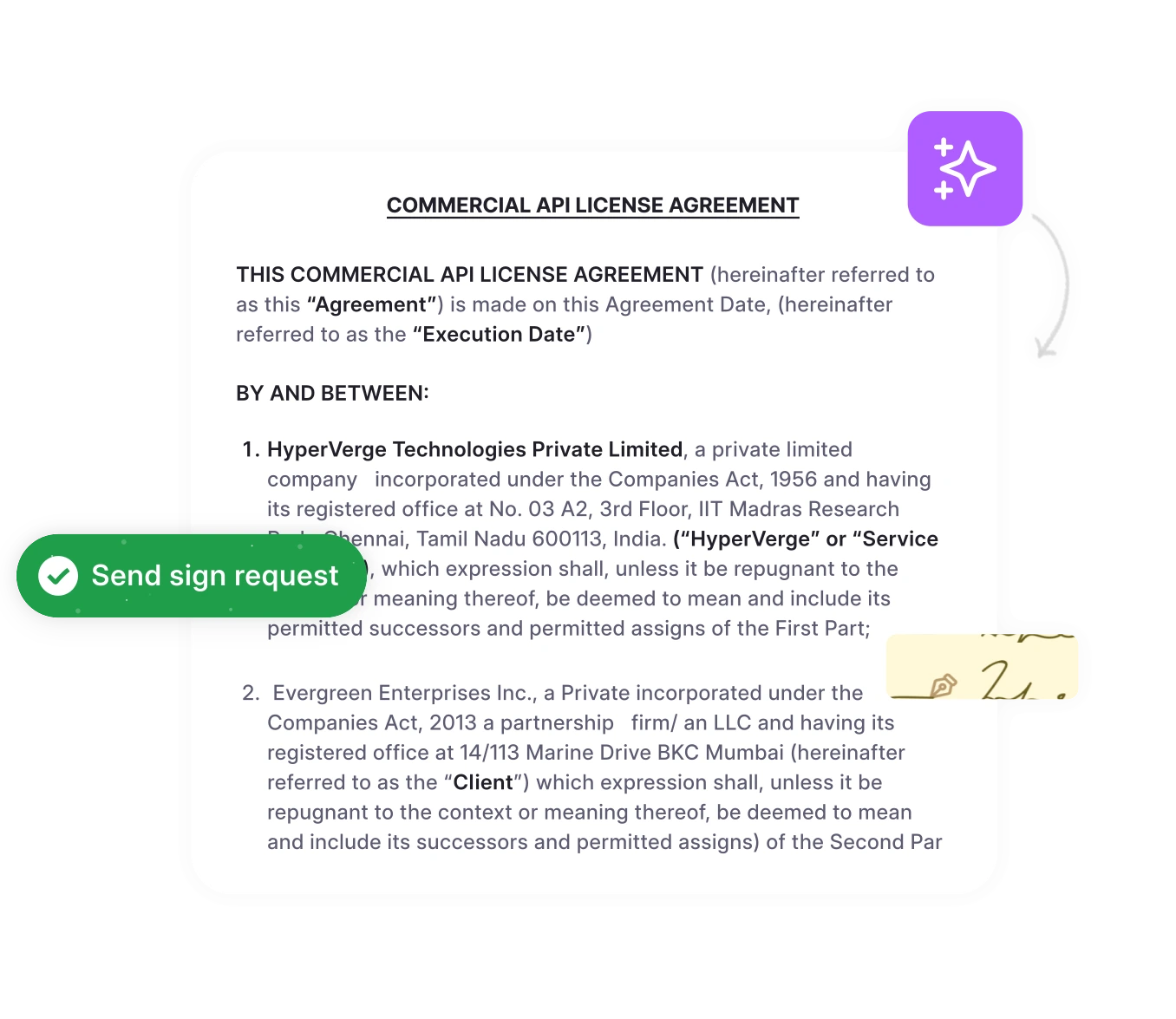Every business relationship begins with an agreement, but not all agreements provide the legal protection your company needs. Whether you’re a startup scaling rapidly or an established company managing complex partnerships, understanding the business contract is essential for protecting your interests and ensuring smooth operations.
Business contracts form the backbone of professional relationships, creating clear expectations and legal protections for all parties involved. From simple service agreements to complex partnership deals, these documents define how businesses work together, resolve contract disputes, and maintain accountability.
This comprehensive guide will walk you through everything you need to know about business contracts, from basic definitions to advanced contract management strategies that help legal teams work more efficiently.
What is a business contract?
A business contract is a legally binding agreement between two or more parties that outlines specific terms, conditions, and obligations related to a business relationship. Unlike casual agreements or verbal promises, business contracts create enforceable legal commitments that protect all parties involved and provide recourse if terms are not met.
Business contracts serve as the foundation for professional relationships by documenting what each party expects to give and receive. They transform informal understandings into formal agreements with legal weight, ensuring that all stakeholders have clear expectations and defined responsibilities.
At its core, a business contract must contain several essential elements to be legally valid: mutual agreement between parties, consideration (something of value exchanged), legal contractual capacity of all signatories, and a lawful purpose. When these elements are present and properly documented, the contract becomes a powerful tool for protecting business interests and managing relationships.
When and why should you use a business contract?
Understanding when business contracts are necessary and why they benefit your organization helps you make better decisions about formalizing business relationships. Here are the 5 key situations where business contracts become essential:
1. Protect your business interests legally
Every business relationship carries inherent risks, from payment disputes to intellectual property theft. Business contracts provide legal protection by clearly defining each party’s rights, responsibilities, and remedies for breach situations. Without written agreements, businesses often struggle to enforce verbal promises or recover damages when relationships sour, leaving them vulnerable to financial losses and operational disruptions.
2. Establish clear expectations and accountability
Misunderstandings between business partners, vendors, or clients can derail projects and damage relationships. Business contracts eliminate ambiguity by documenting specific deliverables, timelines, quality standards, and performance metrics to ensure everyone is on the same page. When everyone understands exactly what’s expected, projects run smoothly, deadlines are met more consistently, and professional relationships remain strong even when challenges arise.
3. Ensure compliance with legal and regulatory requirements
Many industries require written contracts for specific types of business relationships. Employment contracts, real estate transactions, licensing agreements for intellectual property, and financial services contracts often have legal documentation requirements that verbal agreements cannot satisfy. Business contracts help organizations maintain compliance with industry regulations and relevant state laws, helping them to avoid potential legal penalties.
Legal teams improving compliance workflows and automating contract processes help reduce contract finalization time and risks. Metrics like percentage of contracts executed without legal intervention and adherence to contract policies track legal function effectiveness.
4. Create professional credibility and trust
Written contracts signal professionalism and serious intent to potential partners, investors, and stakeholders. Companies with well-structured contract management processes appear more organized, trustworthy, and investment-ready than those operating on handshake deals. This credibility becomes particularly important when seeking funding, forming partnerships, or entering competitive markets where reputation matters.
5. Facilitate dispute resolution efficiently
Even the best business relationships sometimes face disagreements. Business contracts provide predetermined frameworks for resolving disputes through mediation, arbitration, or legal action. Having established dispute resolution procedures saves time, reduces costs, and helps maintain business relationships even when specific issues require formal resolution.
Unlock the power of business contracts
HyperStart’s AI-driven CLM helps you draft, review, and manage agreements with unmatched speed and precision.
Book a DemoThe decision to use business contracts should always favor written documentation over verbal agreements, especially when significant money, time, or strategic value is involved.
How to write a business contract?
Creating an effective business contract requires systematic attention to detail and understanding of both legal principles and business objectives. Here’s a 7-step process to writing business contracts that protect your interests and support successful relationships:
1. Research and understand legal requirements
Before drafting any contract, investigate the legal requirements specific to your industry, location, and type of business relationship, as these can vary depending on circumstances. Different contract types may require specific clauses, licensing information, or regulatory compliance elements. An employment contract, an independent contractor agreement, or a loan agreement all need different legal protections than vendor agreements.
2. Define parties and their roles clearly
Start your contract by identifying all parties involved, including legal business names, addresses, and authorized representatives. Specify each party’s role in the relationship and their primary responsibilities under the agreement. Clear party identification prevents confusion about who has authority to make decisions, approve changes, or enforce contract terms throughout the business relationship.
3. Outline the scope of work or services comprehensively
Detail the work scope and specific details on products, services, and outcomes to prevent misunderstanding. Include specific deliverables, performance standards, quality standards, and acceptance criteria that allow all parties to understand and measure success. Vague scope descriptions lead to disputes and unmet expectations, while detailed specifications create accountability and clear project boundaries.
4. Establish payment terms and financial obligations
Document all payment terms, including total contract value, payment schedules, acceptable payment methods, and late payment penalties. Address expense reimbursements, tax responsibilities, and any cost adjustment mechanisms that might apply during the contract term. Clear financial terms prevent payment disputes and ensure all parties understand their monetary obligations throughout the relationship.
5. Set realistic timelines and deadlines
Include start dates, milestone deadlines, and completion dates along with consequences for delays. Address how changes to timelines will be handled and what constitutes acceptable reasons for deadline adjustments. Realistic scheduling with built-in contingencies helps ensure contract success while providing recourse when timeline issues arise.
6. Add essential legal protections
Include limitation of liability clauses, indemnification provisions, intellectual property protections for assets like trade secrets, and confidentiality clauses appropriate to your business relationship. Address insurance requirements, dispute resolution procedures, and termination conditions that protect all parties while maintaining fair business terms.
7. Review, refine, and execute properly
Have legal counsel review the contract for compliance and risk management before signatures. Ensure all parties understand the terms and have the authority to sign on behalf of their organizations. Use proper execution procedures, including e signatures where legally permissible and secure document storage for future reference.
What are the key elements of a business contract?
Every effective business contract must include key elements to ensure legal validity and practical enforceability. Understanding these essential components helps you create stronger agreements and identify potential weaknesses in contracts you’re asked to sign:
1. Comprehensive party identification
Document the full legal names, business addresses, and contact information for all parties entering the contract. Include business registration numbers, tax identification details, and specify which individuals have authority to sign on behalf of each organization. Proper party identification prevents confusion about legal responsibility and ensures the contract can be enforced against the correct entities.
2. Detailed scope and deliverables
Clearly define what each party will provide under the contract, including specific products, services, or outcomes expected. Document quality standards, performance metrics, and acceptance criteria that determine when obligations have been met satisfactorily. This prevents a situation where one party and the other party have different expectations.
Most of the time, the parties presume based on their previous project experience, and the reality may be different. It is beneficial to spend some extra time clarifying the scope on an in-depth level, and scope clarification meetings, including recording the minutes, are strongly recommended.
3. Payment terms and financial arrangements
Specify the total contract value, payment schedules, acceptable payment methods, and consequences for late payments. For a loan agreement, this would also include interest rates and repayment terms. Comprehensive financial terms ensure all parties understand their monetary obligations and provide recourse when payment issues arise.
4. Timeline and performance deadlines
Establish clear start dates, milestone deadlines, and final completion dates along with consequences for delays or early completion bonuses when appropriate. Address how timeline changes will be managed and what constitutes acceptable reasons for deadline modifications. Well-defined timelines create accountability and help all parties plan their resources effectively.
5. Termination and exit provisions
Document the conditions under which the contract can be terminated by either party, including required notice periods and termination procedures. Address what happens to work in progress, final payments, asset returns, and ongoing obligations after contract termination. Clear exit provisions prevent disputes when business relationships end and ensure orderly transitions.
6. Liability and risk management clauses
Include appropriate limitation of liability provisions, indemnification requirements, insurance obligations, and force majeure protections. Define how risks will be shared between parties and what remedies are available when problems occur. Balanced risk management clauses protect all parties while maintaining fair business terms.
Eliminate uncertainty in business contracts
HyperStart clarifies terms, flags hidden risks, and strengthens enforceability before problems impact your deals.
Book a DemoBusiness contract types (with examples)
Business relationships require different contract structures depending on their nature, complexity, and risk levels. These agreements are used for various transactions and business needs.
For a small business, common contracts include sales contracts, lease agreements for a property owner, and an operating agreement for an LLC.
For larger collaborations, joint ventures may require complex agreements.
A simple promissory note may be used for straightforward loans, while a purchase order or other order forms can constitute a simple contract for goods.
Understanding various contract types helps you choose the right framework for each business situation and ensures your agreements provide appropriate protections:
| Contract Type | Key Elements | Real-World Example |
| Service Agreements (for professional relationships) | Deliverables, timelines, payment terms, intellectual property ownership | Accenture and Microsoft entered into a service agreement to co-deliver cloud and digital transformation services under the Avanade joint venture. The agreement defined service delivery, revenue-sharing, and IP ownership. |
| Vendor and Supplier Contracts (for product relationships) | Quantities, quality standards, delivery schedules, pricing structures, penalties for non-compliance | Apple and Foxconn maintain long-term supplier agreements. Foxconn manufactures iPhones under contracts covering quality standards, delivery deadlines, labor compliance, and pricing arrangements. |
| Employment Contracts (for workforce management) | Compensation, benefits, job responsibilities, termination procedures, confidentiality/non-compete clauses, IP rights | Elon Musk’s Tesla CEO employment contract (2018) tied his compensation to ambitious performance milestones. The contract outlined equity awards worth up to $55 billion, dependent on Tesla’s valuation and revenue targets. |
| Partnership Agreements (for business collaboration) | Decision-making authority, profit sharing, exit/buy-out procedures | Starbucks and PepsiCo signed a partnership agreement for the global distribution of Starbucks ready-to-drink beverages. PepsiCo handles marketing and distribution, while Starbucks benefits from revenue sharing. |
| Licensing Agreements (for intellectual property) | Usage permissions, fees/royalties, restrictions, protection of IP ownership | Disney and Hasbro signed a licensing agreement allowing Hasbro to produce Star Wars toys and merchandise. Disney receives royalties while Hasbro gains rights to use Star Wars IP. |
| Non-Disclosure Agreements (NDAs) (for confidential relationships) | Definition of confidential information, scope of use, duration, consequences for breach | During Facebook’s acquisition of Instagram (2012), both companies signed NDAs to protect financial data, user information, and strategic plans shared during due diligence before the $1 billion acquisition was finalized. |
Each contract type serves specific business purposes and requires different legal considerations to ensure effectiveness and enforceability.
What is the importance the business contract?
Business contracts provide far more value than simple legal documentation – they create the foundation for successful business relationships and strategic operations. Understanding their full importance helps organizations appreciate why investing time and resources in proper contract management pays significant dividends:
1. Establish legal protection and enforceability
Business contracts create legally binding obligations that courts can enforce when disputes arise. Without written agreements, businesses often struggle to recover damages, enforce promises, or protect their interests when relationships deteriorate. Contracts provide documented evidence of what was agreed upon and establish legal remedies for breach situations, giving businesses recourse when verbal agreements prove insufficient.
2. Create predictability and business stability
Written contracts eliminate uncertainty by documenting exactly what each party expects to provide and receive. This predictability allows businesses to plan resources, manage cash flow, and make strategic decisions with confidence. When contract terms are clear and comprehensive, businesses can operate with reduced risk of surprises that might disrupt operations or financial planning.
3. Enable professional relationship management
Well-structured contracts help maintain positive business relationships by preventing misunderstandings and providing frameworks for handling challenges. When problems arise, contracts offer predetermined solutions rather than forcing parties to negotiate resolutions under pressure. This structure often preserves business relationships even when specific issues require formal attention.
4. Support business growth and scalability
As companies grow, contracts become essential for managing the increasing complexity and volume of business relationships. Standardized contract templates and approval processes help organizations handle more relationships efficiently while maintaining consistency and legal protection. Growing companies often discover that systematic contract management becomes crucial for operational efficiency.
5. Demonstrate regulatory compliance
Many industries require specific contract documentation for regulatory compliance, and well-maintained contract portfolios help businesses demonstrate adherence to legal requirements during audits or regulatory reviews. Proper contract management reduces compliance risks and associated penalties while supporting business operations in regulated environments.
The importance of business contracts extends far beyond legal protection to encompass operational efficiency, relationship management, and strategic business value that compound over time.
How to ensure if your business contract is valid
Creating legally valid business contracts requires understanding both fundamental legal principles and practical implementation details.
Invalid contracts cannot be enforced by courts, leaving businesses vulnerable to losses and relationship disputes that could have been prevented with proper contract development:
1. Ensure all parties have legal capacity
Verify that all parties entering the contract have the legal authority to create binding agreements. This includes confirming that individuals are of legal age, mentally competent, and authorized to sign on behalf of their organizations. Business representatives must have explicit authority from their companies to enter into contractual relationships, which may require board resolutions or corporate authorization documentation.
2. Document mutual agreement and consideration
Valid contracts require that all parties agree to the same terms and that each party receives something of value (consideration) in exchange for their obligations. Consideration doesn’t have to be monetary – it can include services, products, promises, or other benefits that hold value for the receiving party. Document the consideration clearly to demonstrate that the contract represents a fair exchange rather than a one-sided arrangement.
3. Maintain lawful purpose and legal compliance
Contracts must serve legitimate business purposes and comply with applicable laws and regulations. Agreements that require illegal activities, violate public policy, or contradict regulatory requirements cannot be legally enforced. Research industry-specific legal requirements and ensure your contract terms align with local, state, and federal regulations governing your business relationship.
4. Use clear, unambiguous language
Avoid vague terms, undefined jargon, or ambiguous language that could be interpreted multiple ways. Courts often interpret unclear contract terms against the party who drafted them, so precise language protects all parties by eliminating confusion about obligations and expectations. Define technical terms, specify measurement standards, and document assumptions that might not be obvious to all parties.
7. Maintain proper documentation and records
Keep comprehensive records of contract development, negotiations, modifications, and performance to support validity if disputes arise. Document any changes through formal amendments rather than informal agreements, and maintain organized contract files that demonstrate the legitimate business purpose and proper execution of all agreements.
Stay in control of contract obligations
Track terms, monitor deadlines, and enforce compliance seamlessly with HyperStart’s AI-powered contract management system.
Book a DemoContract validity requires attention to both legal technicalities and practical business considerations that support enforceability and relationship success.
The role of CLM platforms in your business contract portfolio
Contract Lifecycle Management (CLM) platforms have revolutionized how organizations create, manage, and optimize their business contracts. As contract volumes grow and business relationships become more complex, CLM technology provides the automation and intelligence needed to handle contracts efficiently while maintaining legal accuracy and compliance:
1. Automate contract creation and template management
Modern CLM platforms streamline contract development by providing intelligent template libraries, automated clause selection, and guided contract assembly that reduces creation time from hours to minutes. Legal teams can standardize language, ensure compliance requirements are met consistently, and enable business teams to generate contracts independently using approved templates and workflows, which are often more reliable than free templates you find online.
HyperStart’s AI-powered platform enables legal teams to process contracts 80% faster than traditional manual methods while maintaining accuracy and legal compliance standards. The intelligent template system learns from past contracts to suggest optimal clause combinations for different business scenarios.
2. Enable intelligent contract review and analysis
AI-powered contract analysis capabilities help legal professionals identify risks, extract key terms, and ensure consistency across contract portfolios. Advanced CLM platforms can analyze contract language, flag unusual terms, and provide recommendations for standard clause improvements that protect business interests while accelerating approval processes.
3. Streamline approval workflows and collaboration
AI-powered contract management software automates approval routing based on contract type, value, or risk level while providing real-time visibility into review status and bottlenecks. Stakeholders can collaborate efficiently through integrated comment systems, track changes systematically, and maintain comprehensive audit trails that support compliance and relationship management requirements.
4. Ensure compliance and risk management
Comprehensive compliance monitoring capabilities enable organizations to maintain regulatory adherence, track regulatory changes, and ensure that contract terms align with legal requirements across various jurisdictions. CLM platforms offer centralized risk assessment tools and automated compliance reporting that support audit processes and regulatory reviews.
5. Integrate with existing business systems
Modern CLM platforms integrate seamlessly with CRM systems, financial platforms, procurement tools, and other business applications to create unified workflows and eliminate data silos. This integration ensures contract information flows efficiently across business processes and supports comprehensive relationship management strategies.
CLM platforms represent a strategic technology investment that transforms contract management from a burdensome administrative task to a competitive advantage for growing organizations.
Streamline your business contracts with AI-powered efficiency
Understanding business contracts is just the first step – implementing efficient contract management processes that scale with your business growth requires the right technology and strategic approach. Traditional manual contract processes that worked for smaller organizations become significant bottlenecks as companies scale and contract volumes multiply.
HyperStart’s AI-powered contract lifecycle management platform transforms how legal teams handle business contracts, reducing processing time by 80% while maintaining accuracy and compliance standards.
From intelligent contract creation to automated renewal management, HyperStart provides the tools growing companies need to manage contracts efficiently without sacrificing legal rigor.
Ready to transform your contract management processes? Book a demo and discover how HyperStart’s AI-native platform helps legal teams process contracts faster while maintaining the accuracy and compliance standards your business demands.











